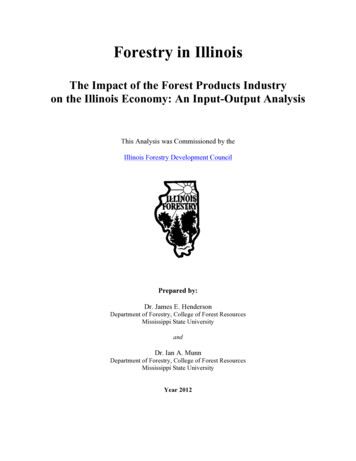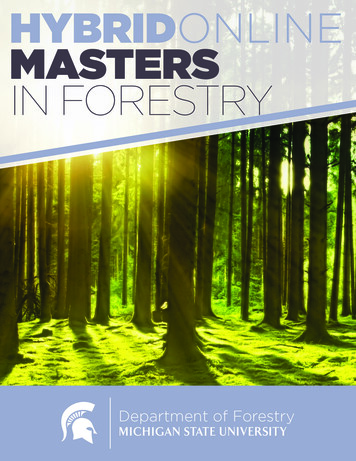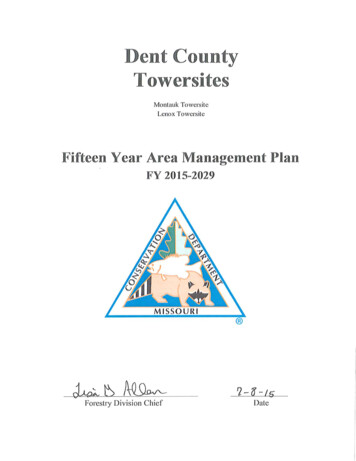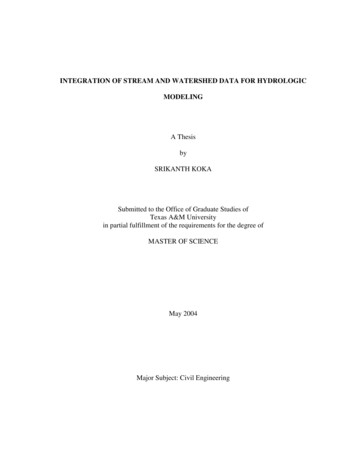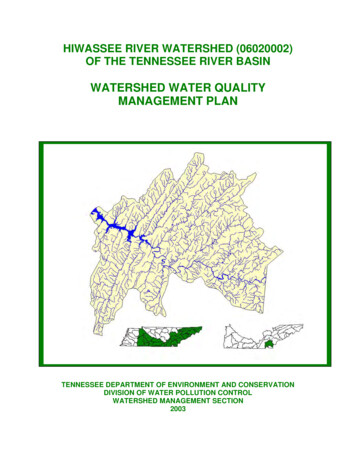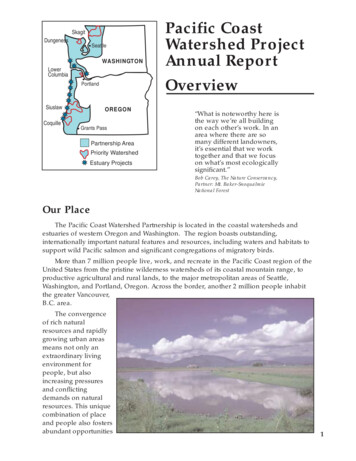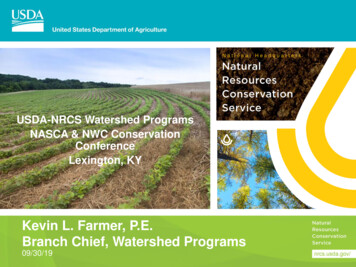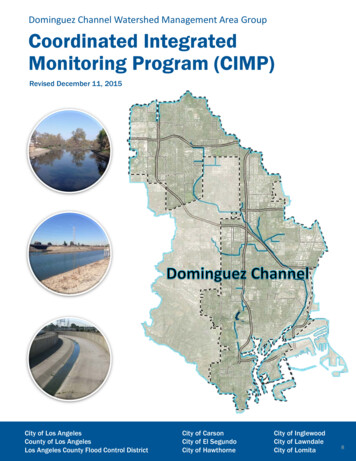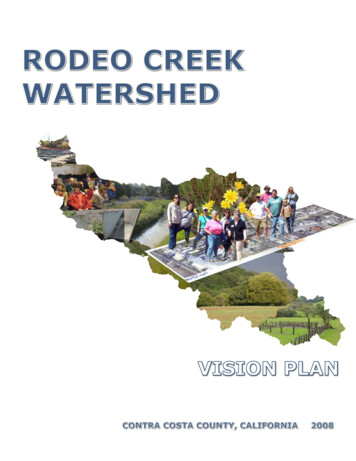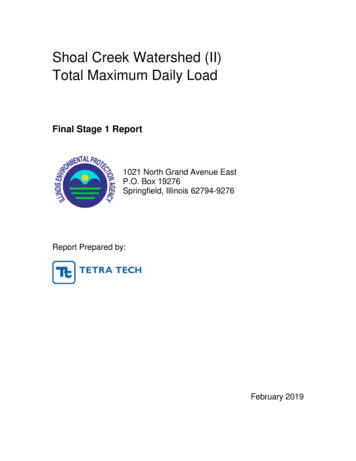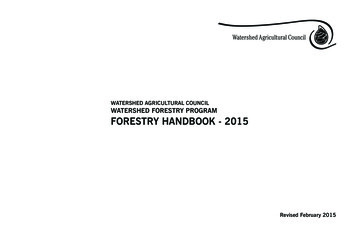
Transcription
WATERSHED AGRICULTURAL COUNCILWATERSHED FORESTRY PROGRAMFORESTRY HANDBOOK - 2015Revised February 2015
January 2015The Watershed Agricultural Council’s Forestry Program continues to be committed to water quality protection through theprinciples of sound forest stewardship, strong wood-based economies, and working landscapes. As the Program matures, our efforts toreach more landowners, students, forestry professionals, and business owners have never been greater. Over the years, we’ve learnedhow important our partners are in helping us realize our mission and goals. This handbook was created to help users understand thespecific policies that govern the WAC Forestry Program. Whether you are a Watershed Qualified Forester writing management plansfor private landowners or a teacher seeking bus tour funds for her class to visit the watershed, this booklet should help you find theanswers you need.The contents of this booklet have evolved from The Watershed Forest Ad Hoc Task Force’s “Policy Recommendations forthe Watersheds of New York City’s Water Supply” published in July 1996. The Policy Recommendations, also known as “The GreenBook,” enabled the Watershed Forestry Program to grow thanks largely to its strong partnership with the New York City Department ofEnvironmental Protection and the US Forest Service.With headquarters in Delaware and Westchester Counties, the WAC Forestry Program team is here to help you. Our contactinformation can be found on the last page of the handbook. So call us or send an e-mail with any questions. We look forward to hearingfrom you.The WAC Forestry Programwww.nycwatershed.org
Table of Contents5. WAC Forestry Program Organizational Chart6. WAC Forestry Program Committee Working Group Charges8. Education and Training8. Watershed Forestry Institute for Teachers11. Watershed Forestry Bus Tours(including Green Connections option)15. Catskill Streams & Watershed Education Program17. Logger Training18. Forester Training19. Landowner Education20. Watershed Forest Management Planning20. 480a Enrollment Incentive22. 480a Update Incentive24. Implementation24. Management Assistance Program26. Tree Planting27. Timber Stand Improvement (TSI)28. Riparian Improvement29. Wildlife Improvement32. Invasive Plant Control33. Croton Trees for Tributaries35. Best Management Practice (BMP) Program35. Portable Bridge Loan37. Portable Bridge Cost-share38. Portable Bridge Rental39. Best Management Practice (BMP) Free Sample39. Erosion Control (formerly Timber Harvest/Forest Roads)42. Research and Demonstration42. Model Forests44. Forest Products Utilization and Marketing44. Catskill WoodNet46. Pure Catskills Wood Products Branding Campaign47. Wood-based Economic Development Training48. WAC Agricultural Conservation Easements48. Forest Management Plans Guidelines54. Forest Harvest Plan Guidelines58. Useful References58. Glossary of Terms60. Watershed Forestry Program - Contact Information61. Related Websites62. NYC Watershed Region Maps
5
WAC Forestry Program Committee Working Group ChargesForestry Program Working Groups provide technical oversight and guidance for specific efforts within the Forestry Program. Thesegroups are comprised of individuals possessing technical knowledge who are appointed to the working groups by the Forestry ProgramCommittee Chair. The Forestry Program Working Groups are tasked with reviewing technical details as they pertain to the individualefforts (Logger Training, Urban/Rural Ed, Model Forest and U&M) and providing recommendations to the Forestry Program Committee.In certain circumstances the Forestry Program Committee has delegated approval authority to the working groups as outlined in theForestry Program Handbook.Logger Training Working GroupThis working group will develop strategies to promote and manage the Trained Logger Certification (TLC) Program throughout theCatskill/Delaware and Croton watersheds to improve the quality of timber harvesting and provide greater water quality protection. Thestrategies developed by this working group will be recommended to the WAC Forestry Program Committee for review and approval.This voluntary program is supervised by New York Logger Training, Inc., which is a consortium of timber harvesters and forest industryrepresentatives supported by government and educational institutions. The duties performed by this working group are: oversight ofCatskill/Lower Hudson region TLC annual training schedule, development of promotional materials, and coordination with New YorkLogger Training Inc. to ensure the integration of Catskill/Lower Hudson Logger Training with state-wide efforts. Members: MarilynWyman (Greene County CCE), Rick Lutz (TLC Logger), Eric Dahlberg (TLC Logger), Jake Rosa (TLC Logger) Karl Von Berg (WAC), JohnSchwartz (NYC DEP), Eric Carlson (ESFPA/NYLT), Roger Bresee (Logger), Larry Schaefer (Cannonsville Lumber).Urban/Rural School-Based Education Working GroupThis working group is charged with supporting and steering the four components of the Urban/Rural School-Based EducationInitiative: The Watershed Forestry Institute for Teachers (WFIT), Green Connections, Watershed Forestry Bus Tour Program and theCatskill Stream & Watershed Education Program (CSWEP). The duties performed by this working group are: recommend criteria forparticipation in programs, review and select participants for programs: annually review the education program guidelines, periodicallyassess and evaluate program strengths and weaknesses, and review and discuss special situations not covered by the educationprogram guidelines. Additionally, over the next year, the working group has been tasked with developing the goals, objectives andmeasurable outcomes for each of the program areas. The strategies developed by this working group will be recommended to the WACForestry Program Committee for review and approval. Members are to include: Bus Tour Coordinator (Common Ground), ConservationEducation Coordinator for the NE Region (US Forest Service), Education Coordinator (CWC), Watershed Educator (WAC), DeputyDirector of Education and Outreach (NYC DEP), Section Chief – Working Lands (NYC DEP).6
Model Forest Working GroupThis working group will develop strategies to promote and manage the four existing Model Forests: Clearpool, Frost Valley, Lennox andSiuslaw The Model Forests are intended to be living classrooms that highlight various BMP’s, silvicultural prescriptions, invasive speciesissues, and forest stewardship practices as well as other topics that are relevant to the protection of water quality and the sustainablemanagement of watershed forests. The strategies developed by this working group will be recommended to the WAC Forestry ProgramCommittee for review and approval. Members: Marilyn Wyman (Greene County CCE, Siuslaw Model Forest), Beth Rhines (ClearpoolModel Forest), John Hannum (Delaware County CCE, Lennox Model Forest), Heather Bowman (Frost Valley YMCA, Frost Valley ModelForest), René Germain (SUNY ESF), Josh VanBrakle (WAC), John Schwartz (NYC DEP), SUNY ESF Model Forest Graduate StudentCoordinator.Useful DefinitionsPrinciple:Generally developed by the board and staff during the strategic planning process.Policy: Developed by the Council to provide an overarching framework within which decisions are to be made in. Example: WACwill use a competitive process in purchasing goods and services with preference given to women and minority owned business andbusinesses headquartered within the watershedGuideline: Developed by Committees to provide guidance to staff. Example: Total maximum funding per application will not exceed 5,463.64 ( 6,895.85 TLC) without prior approval of the WAC Forestry Committee.Standard Operating Procedure: Developed by staff for internal use. Example: The Finance Director and Grants Specialist will open thesealed bids at the advertised time, develop a list of responsible bids ranked from the lowest to highest including any preferences andforward it to the Executive Director with a recommendation of who to award the bid to.7
Education and TrainingA. URBAN/RURAL SCHOOL BASED EDUCATIONMission: To provide educators with the knowledge and resources to promote student understanding of the social and ecologicalconnections that compose the New York City drinking water supply system.I.II.III.Watershed Forestry Institute for Teachers (WFIT)Watershed Forestry Bus Tours (including Green Connections option)Catskill Stream and Watershed Education Program (CSWEP)I. Watershed Forestry Institute for TeachersDescription: The Watershed Forestry Institute for Teachers is a six-day professional development educational program thatimmerses 4th – 12th grade teachers in a hands-on study of the New York City Watershed forestry and water quality sciences.Watershed and New York City participants are trained in various environmental education curricula that they can use to teachtheir students in the classroom and in the field. The Institute may include field trips to a watershed model forest, a NYCwater supply reservoir, an active timber harvest site, a local wood products business, and other watershed forestry projectsites as appropriate. In addition, participants are exposed to resource professionals and other watershed education programs,thereby becoming part of a broader environmental education network/community. Participants develop implementation goalsand objectives for the upcoming school year and receive on-going support with program implementation from the resourceprofessionals met at WFIT. WFIT graduates are then eligible to apply to the twelve-week Green Connection program, theWatershed Forestry Bus Tour program, and Catskill Stream Watershed Education Program (CSWEP is not currently available toNew York City teachers).Eligibility: 4th to 12th grade teachers from New York City or a school serving the New York City water supply watersheds(Catskill/Delaware and Croton systems) are eligible to apply for the Institute held in the summer (usually late July or earlyAugust). Past WFIT participants are invited to apply again provided that at least five years have passed between their firstWFIT and the current year for which they are applying. Applicants who are denied admission or placed on a waiting list are8
encouraged to reapply the following year.Procedures and Participation Requirements:1. Applications are available on the WAC website. Applications are due by May 1st with participants learning their statuswithin one month.2. Participation is limited to 20 teachers — ideally we seek an equal mix of 10 teachers from the New York City MetropolitanArea and 10 teachers from the Catskill/Delaware and Croton Watershed regions.3. After applications are received, the Urban/Rural School-Based Education Working Group meets to evaluate theapplications. They use the following criteria to evaluate each applicant:a. Ability to fully participate in the six-day Institute, including staying at the facility overnight with fellow participantsb. Interest in forestry, water resources, and environmental sciencec. Capacity and commitment to transfer educational material learned at the Institute back into classroom setting and/or the ability to expand current classroom curricula and learning opportunitiesd. Enthusiasm for the outdoors and environmental educatione. Evidence of support for the program from within the school administrationf. Ability and commitment to remain on site for the entire WFIT (no permission is granted to leave early in the week,begin late, miss days, or spend overnights off-site/commute)g. Preference is given to teachers that apply together from the same school, and to teachers who work alongsidea previous WFIT participant at their school (as these teachers will be able to provide on-going stimulation andsupport to each other with respect to program development and implementation).h. Some preference is also given during the review process to teachers of the same grades/age groups, so as tomaximize the potential for working upstate/downstate partnerships to be developed.4. Upon being selected for the Institute, participants are provided with a list of items to bring with them during their stay.Food, lodging and classroom supplies are provided as part of the Institute. Participants are responsible for their owntransportation to and from the Institute, to make necessary arrangements for their six-day stay, and to fulfill any other9
special needs.5. During WFIT, teachers are exposed to resource professionals and curricula to assist them with integrating watershed andforestry education into their teaching. Teachers are strongly encouraged to develop upstate/downstate partnerships to aidthem in their applications to Green Connections and possibly the Watershed Forestry Bus Tour Program.6. After WFIT, follow-up support and assistance is available from the resource professionals met during the Institute beginningin the fall of the upcoming school year. All WFIT graduates are eligible to apply to Green Connections and the WatershedForestry Bus Tour Program. WFIT graduates from the Watershed can also take part in the Catskill Stream and WatershedEducation Program.10
II. Watershed Forestry Bus ToursDescription: The Watershed Forestry Bus Tour Program offers matching grants to organize field trips to the New York Citywatershed (Catskill/Delaware and Croton systems). The purpose of the Bus Tour Program is to raise awareness about the NewYork City water supply system from source to consumption and highlight the role healthy forests play in maintaining cleandrinking water Participants learn how sustainably managed forestland protects water quality and supports economic viability. Aprogram priority is to facilitate NYC students visiting and experiencing a water supply reservoir and forested landscape for thevery first time.In addition to standard bus tours, the Bus Tour Program also offers a Green Connections Option, which links urban schools inNew York City with an established upstate partner school in the Catskill/Delaware or Croton watershed. Partner classroomsparticipate cooperatively in field trips, communications, and curricula throughout the school year. The Green ConnectionsOption teaches students about the connection between healthy forests and clean drinking water. The experience also helpsdevelop an appreciation for the different watershed environments in which the students live.Bus Tour Program Eligibility: Any organization, community group, professional association, 4th – 12th grade classroom orother interested entity within the five boroughs of New York City and upstate watershed regions (Catskill/Delaware and Croton)is eligible to apply for up to 3,000 in funding to visit the NYC Watershed.Green Connections Option Eligibility: Any 4th – 12th grade classroom teacher who has attended a previous WatershedForestry Institute for Teachers (WFIT) is eligible to apply for the Green Connections Option. The Green Connections Optionprovides teachers with the opportunity to apply the knowledge, skills and resources they acquired during WFIT. Preference isgiven to 4th – 8th grade classrooms and pre-existing partnerships developed during WFIT or through other teacher initiatives.Partnerships are eligible to apply for up to 5,000 ( 2,500 per school) in funding for their field trips.Bus Tour Program Guidelines:1. Matching funds: The Bus Tour Program requires a 1 to 1 match of funds. Eligible matching funds are in-kind services,cash expenditures, or other non-federal funds.11
2. Grant funds are awarded in two payments, with the first payment being a cash advance of half of the awarded funds.The second half of the funds will be paid upon grant completion. The grant is considered complete when a detailed finalperformance report along with paid receipts, proof of matching funds, pre- and post-surveys, and examples of studentwork are submitted and approved.3. One-day watershed tours that do not visit an environmental education facility are limited to one bus. Multiple buses areonly funded for groups that intend to visit an environmental education facility.4. Bus Tour Program Application Submission and Review:a. Bus Tour applications will be reviewed and approved twice each year in January/February and August/September.b. Applications are due in early January and August. Applicants will be notified of their approval status within six weeksof the application submission deadline. Applications are available online at www.nycwatershed.org/for bustours.htmlor by contacting the Watershed Educator, Tyler Van Fleet at (914) 962-6355 or education@nycwatershed.org.c. Participation in the Program is competitive: Approximately 40% of funding will be allocated to new groups, 40% torepeat applicants and 20% to professional development opportunities (primarily adult audiences).d. The following criteria are used by the Urban/Rural Education Initiative Working Group to review and approveapplications.Bus Tour Application Approval Criteriai. Completeness of application (including application form, budget page, proof of matching funds and proof ofadministrative support)ii. Description of relevant classroom content to be used before and after the tripiii. Description of how and where the New York City water supply system will be studied on the planned touriv. Description of how and where forest ecosystems and their relation to water quality will be studied on the plannedtourv. Identification of individual committed to budget management and field trip logisticsvi. Additional points may be awarded in the following categories:1. Prior participation in WFIT2. Financial need3. Communication4. Tours that integrate ongoing service or stewardship projects12
5. Teacher participation and track record in other watershed programsGreen Connections Application Approval Criteriai. Successful completion of the Watershed Forestry Institute for Teachers (WFIT)ii. Completeness of application (including application form, budget page, proof of matching funds and supportingdocumentation)iii. Appropriate grade levels (4-12) and subject matter taught by partnering teachersiv. Commitment to fully participate in the Green Connections Program, including initial full-day planning session,curriculum requirements, willingness to complete necessary program evaluation and assessments and submissionof student work, communication with partner classroom, and attendance on two field trips, one to the watershedand another to New York Cityv. Commitment to educating students about forestry in the watershed and the New York City Water supply systemvi. Evidence of support for the program from within the school administration i.e. letters of support, participation intrips by school leadership, etc.vii. Identification of individual committed to budget management and field trip logisticsviii. Additional points may be awarded in the following categories:1. Financial need2. Communication3. Tours that integrate ongoing service or stewardship projects4. Teacher participation and track record in other watershed programs5. Approved Bus Tour Grantee Responsibilities:a. Bus Tour grant recipients will have one year from the date of notification to complete their bus tour.b. Previous Bus Tour Program grants must be successfully completed before applicants are eligible to apply for a new BusTour Program grant.c. Once funding has been awarded, each new grant recipient is required to meet the Watershed Educator or Bus TourCoordinator for orientation. This orientation will include a discussion of the proposed tour, and a review of the pre-tourinformational materials.d. Grant recipients are expected to manage the budgets and submit detailed itineraries for approval during the field tripplanning process. Budget overruns are the responsibility of the recipient.13
e.Grant Recipients will complete a pre and post survey given to them by the Bus Tour Program Coordinator prior to andafter their tour.6. Approved Green Connections Option Grantee Responsibilities:a. Green Connections grant recipients will have one year from the date of notification to complete their bus tour.b. Previous Green Connections Options grants must be successfully completed before applicants are eligible to apply for anew grant.c. Once funding has been awarded, each Green Connections participant will participate in an orientation meeting withthe Watershed Educator or Bus Tour Coordinator. Discussion will include field trips, budget, curriculum planning,budgeting and the binder that is provided to each teacher for submission to the Coordinator at the end of the schoolyear.d. Coordination of the field trips will be the responsibility of each teacher. Detailed itineraries are required to besubmitted to the Bus Tour Coordinator in advance of each trip and a final calendar will be submitted in the binder.e. Participating teachers will administer pre and post program assessments to students to assess learning outcomesassociated with the program. These assessments will be collected in the binder.f. Teachers will complete all standards-based curriculum activities, with optional extensions, and facilitate at least threecommunications between upstate and downstate students participating in the program. Modifications to lesson plansand examples of student work are to be collected and assembled in the binder.g. Teachers are expected to manage the budgets during the field trip planning process. Budget overruns are theresponsibility of each teacher. All receipts and matching fund documents are to be collected and submitted in thebinderh. At the end of the school year (no later than July 1st), participating teachers are required to submit the final binder thatdocuments: 1) Pre and post student assessments; 2) Modifications to lesson plans; 3) Examples of student work; 4) Acompleted calendar; 5) A completed budget, including receipts and matching fund documents; 6) Photos.14
III. Catskill Streams and Watershed Education Program (CSWEP)Description: The Catskill Stream and Watershed Education Program provides classroom and in-field instruction for thirty 4th-12thgrade classes within the Catskill/Delaware watershed only. The five-lesson program covers topics related to the Catskill/Delawarewatershed, stream and watershed stewardship, and stream monitoring and management techniques. Three classroom lessonscovering: the water cycle, watersheds, the construction and ongoing management of the NYC water supply system, groundwaterfunction, and stream monitoring techniques and data analysis; are coupled with two outdoor lessons monitoring the health ofa local stream and surrounding watershed. The purpose of the program is to raise upstate student awareness of the NYC watersupply system, and promote good stewardship of the unique watershed these students live within.Eligibility: 4th to 12th grade teachers in the West-of-Hudson watershed are eligible for this program. A recruitment priority is givento schools near stream restoration work, or in localities developing stream management plans.Procedures and Participation Requirements:1. WAC solicits participants from targeted West-of-Hudson schools in late-August. Contact is made with Science departmentheads, and past education program or WFIT participants.2. Participation in the program is limited to thirty 4th-12th grade classes in the West-of-Hudson Watershed. Admission is opento teachers on a first come, first served basis until the class limit (30 classes total) is reached.3. After teacher responses are received, class visits are scheduled for the thirty classes by WAC via phone and emailcorrespondence. Three visits per class are scheduled between mid-September through early-November with an additionaltwo visits scheduled to take place between April and June.4. WAC administers a pre-program assessment to the students in each of the thirty classes.5. Throughout the fall, WAC provides two in-class lessons covering basics of watershed functions, the history and ongoingmanagement of the NYC water supply system, groundwater function, stream function, stream monitoring, and stream and15
watershed management. A third visit provides an in-stream lesson allowing students to monitor a local stream and collectpertinent water quality and riparian buffer data.7. In the spring WAC returns to each class for an additional stream visit, again collecting pertinent stream and riparian data.8. WAC returns to each class for a final lesson of data analysis and a program wrap-up. A program post-assessment isadministered to students at this time.16
B. LOGGER TRAININGDescription: The WAC Forestry Program promotes and supports Trained Logger Certification (TLC) within the New York Citywatershed region. TLC is coordinated on a statewide basis by New York Logger Training, Inc. (NYLT) and within the New YorkCity watershed region by the WAC Forestry Program and Greene County Cornell Cooperative Extension.Eligibility: Any Timber Harvester who conducts 25% of his/her work within the NYC watershed.Procedures and Participation Requirements:1. TLC is awarded to loggers who have completed the three core courses: Adult First Aid/CPR, Forest Ecology & Silviculture,and Game of Logging Level 1 (a chainsaw safety class). The three core TLC courses are offered twice annually, once in thespring and again in the fall.2. Upon receiving their TLC, loggers are certified for a three year period. Over this period loggers must complete threecontinuing education credits in order to be eligible to renew their certification for an additional three year period. Inaddition to the three core courses, a minimum of one continuing education course will be offered each year to provideloggers with the opportunity to maintain their certification. The following are examples of continuing education courses thathave been offered in previous years: Skidder Bridge Construction, Log Bucking for Quality, Advanced Logger Rescue, VernalPools and an Introduction to GPS Units.3. A calendar of events identifying training opportunities is printed and distributed each January.4. Local saw mills are encouraged to participate in the TLC mill rate incentive program where TLC loggers receiveapproximately 5/mbf (refer to annual Logger Training Calendar for current rates).5. WAC will provide a reimbursement of 75% of the cost of non WAC workshop expenses for Catskill/Lower Hudson loggersattending non-WAC sponsored logger training events. Loggers are required to provide documentation of the total cost of theworkshop as well as their attendance.6. The WAC Forestry Program gives priority to TLC loggers when approving BMP Implementation Program applications inaddition to providing TLC Incentive rates for Best Management Practices (Refer to the BMP Implementation portion of thishandbook for specific TLC Incentive opportunities).17
C. FORESTER TRAININGDescription: The WAC Forestry Program supports continuing education for foresters within the NYC Watershed region to enablethem to become “Watershed Qualified” and therefore eligible to write Watershed Forest Management Plans. Each year, theWAC Forestry Program provides at least one training opportunity for new foresters to become Watershed Qualified. This oneday workshop highlights important topics such as BMP Implementation, Riparian Area Management and Forest ManagementPlanning. It also introduces Foresters to WAC Forestry Program staff, the administrative process for writing Watershed ForestManagement Plans, and various other program opportunities. In addition to offering the “Becoming a Watershed QualifiedForester” Workshop, the WAC Forestry Program also offers various continuing education opportunities covering topics such asGPS/GIS Technology, Portable Bridges and Deer Density Surveys.Eligibility: Training opportunities are open to all Foresters. Individuals who desire to become a Watershed Qualified Forestermust have a B.S. or associate degree in forestry.Procedures and Participation Requirements:1. Foresters must attend the “Becoming a Watershed Qualified Forester” workshop in order to be a Watershed QualifiedForester.2. Watershed Qualified Foresters are required to attend additional educational courses deemed necessary by WAC ForestryProgram staff in order to remain Watershed Qualified.3. In the event a consulting forester can not attend the “Becoming Watershed Qualified Consulting Forester” workshopWAC Forestry Program staff can conduct one-on-one training. This training will be restricted to instances where theconsulting forester can not attend the workshop due to extenuating circumstances. The one-on-one training will cover allthe information covered in the “Watershed Qualified Consulting Forester” workshop agenda and it will be documented forcommittee notification.18
D. LANDOWNER EDUCATIONDescription: The WAC Forestry Program supports numerous forest landowner conferences and other educational programsthroughout the watershed annually. These workshops engage watershed landowners in becoming better stewards of theirwoods and help them realize the opportunities available to them as forest landowners. Landowner education programs areadvertised online as well as in mailings and newsletters. Master Forest Owners ProgramLandowner Letter SeriesLandowner Education Workshops19
Watershed Forest Management Planning1. 480a Enrollment Incentive: The New York State Forest Tax Law (480a) represents a long term commitment by private forestlandowners to actively steward their forest resources. To encourage this long term commitment, the WAC Forestry Program providesa 480a Enrollment Incentive payment to help private forest landowners offset the cost of enrolling in 480a.a. Goal: To encourage the enrollment of new land in the 480a Tax Law.b. Eligibility:i.Any private landowner owning at least (50) acres of forestland within the NYC Watershed.ii.The applicant property is not currently enrolled in the 480a Tax Law.iii. The
The Watershed Agricultural Council's Forestry Program continues to be committed to water quality protection through the . Members: Marilyn Wyman (Greene County CCE, Siuslaw Model Forest), Beth Rhines (Clearpool Model Forest), John Hannum (Delaware County CCE, Lennox Model Forest), Heather Bowman (Frost Valley YMCA, Frost Valley Model .
